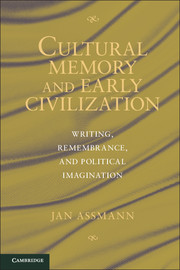2 - Written Culture
from Part I - The Theoretical Basis
Published online by Cambridge University Press: 05 June 2012
Summary
From ritual to textual continuity
Ancient Egyptian culture had a very definite concept of what was needed to keep the world in motion. The main features were activities of a ritual or spiritual nature through which a whole edifice of knowledge was passed on whose foundations were laid far more by rites than by books. If the rituals were not properly performed, the world would fall apart, and correctness was a matter of knowledge – an officium memoriae. Similar ideas can be found in China where everything depended on ritual and on those who were assigned to carry it out by keeping the world in their heads and by not forgetting anything. In Judaism, things were different. The Jews detached themselves from such rituals, concentrating instead on the interpretation of texts. This guaranteed – in the words of Peter Schäfer – “harmony between Heaven and Earth.”
The language in the sources and the particular concepts of each culture can be subsumed under the single heading of “continuity” – a continuity that is ritual in Ancient Egypt and China, and textual in rabbinical Judaism as the ritual continuity was lost with the destruction of the temple in 70 AD. From then on the seat of knowledge was no longer the performance of sacred actions and recitations, but the scholarly study of the written, foundational word. In the context of cultural history, we can call this the transition from ritual to textual continuity. Hölderlin's poem Patmos provides an extraordinarily succinct summary of this movement from cosmic rites to textual interpretation:
Without awareness we've worshiped
Our Mother the Earth, and the Light
Of the Sun as well, but what our Father
Who reigns over everything wants most
Is that the established word be
Carefully attended, and that
Which endures be interpreted well.
- Type
- Chapter
- Information
- Cultural Memory and Early CivilizationWriting, Remembrance, and Political Imagination, pp. 70 - 110Publisher: Cambridge University PressPrint publication year: 2011
References
- 1
- Cited by



